- Home
- Lucius Shepard
Louisiana Breakdown Page 5
Louisiana Breakdown Read online
Page 5
“It’s all true,” she said. “Whatever they told you.”
“They just said you’re weird. But you don’t seem weird to me. Unusual, maybe.”
“How’m I unusual?”
He dropped his pitch half an octave and said in a slowed-down sexy voice, “I haven’t put my finger on it yet.”
“You ain’t never gonna put your finger on it, you don’t start treatin’ me real.”
“Hey, give me a break,” he said. “I’m just trying to impress you with my savoir faire.”
“You already impressed me. But every time you open your mouth I’m gettin’ less impressed. I told you, you don’t have to sell me nothin’.”
“If I can’t use my good material, I’m not going to have a whole lot to say. ’Least not ’til I get to know you.”
“That’s good. I hear you a lot better when you not sayin’ nothin’.”
The bartender asked Vida if she wanted something, and she said, “No.” She’d never had dealings with any of the Nine Forms before now, and maybe, she thought, they always interacted with you as man to woman, woman to man. She supposed that was how you had to treat them in turn.
Jack cocked his head to the side, as if to see her more clearly, then considered the strings of the guitar. He fingered one, but didn’t pluck it. His ocean-colored eyes engaged her again and held. She saw down to the place inside him that the Form wanted her to swim to. Love had to come, she realized, or else the Form couldn’t emerge to help her.
The notion of love nettled Vida. It wasn’t that difficult a spell to work. Jack was a good-looking man and the fact that the Form had chosen him to be its horse while in the flesh, to convey it through the world, meant he was a worthy vessel. She had seen enough of him and understood enough about her own predilections to know that she could work that change in both of them. She had his eye already and his soul was ready to follow. But love was ever a struggle. It took a mustang heart to survive the race it ran. Vida wasn’t sure she was up to the task—but what choice was there? She could remain in Grail, plagued by Marsh and his dream weaponry, or she could let the Form enfold her and carry her away.
“You can stay with me,” she said.
He said, “What?”
She slid off the barstool. “Y’gotta car?”
His perplexity deepened. “It broke down out on the highway. I guess it’s getting repaired.”
“We can take my pickup then. It’s back at the diner.”
It seemed he wanted to express doubt concerning this arrangement, but his higher nature prevailed and he came to his feet. He offered the silver guitar to the long-haired kid, but Joe Dill sang out above the music, “Hey, Cody!”
The kid, about to take the guitar, stopped with his hand out and said, “Yeah?”
“Let the man hang onto it a day or two.” Joe Dill ambled over, the Vietnamese woman at his shoulder. “He plays it a helluva lot better’n you. Maybe he’ll play us some more ’fore he leaves.”
“It’s worth over a thousand dollars,” Cody said querulously.
“I’m good for it,” Joe Dill said. “Ol’ Jack ain’t goin’ nowhere ’til they fix his Beamer.”
“Hey,” Jack said. “It’s okay. I got my own guitar.”
Joe Dill bullied Cody with his eyes. Finally Cody said, “Naw, man. Go ahead. It’s cool.”
Jack glanced back and forth between them, shrugged, and said, “Whatever.”
The Springsteen song ended.
Vida caught Sedele staring hotly at her and turned away, not because she was unnerved, but because she didn’t want to deal with that sad, intense look. Out of the corner of her eye she saw Sedele heave a sigh and walk off toward the jukebox.
Everyone was watching them now. Old men, a boy at the pool table, the dancers. Jack’s face tightened. The Form had let him bear witness to the evil here, Vida thought.
Joe Dill made a benediction with his right hand, sketched the sign of the cross in midair, smiling a humorless smile that turned the gesture into a mockery.
“Be fruitful and multiply,” he said.
On her stool, the Vietnamese witch rolled the poker dice across the polished surface of the bar and laughed at the result.
As they reached the entrance Jack opened the door and put a hand lightly on Vida’s lower back to guide her through. The touch gave her a thrill, a little electric surge that rippled down into her buttocks and between her legs.
Love starting its run.
A synth beat issued from the jukebox; a man’s voice muttering, the words not quite audible, hut menacing nonetheless, and then a woman began to scream, crying out to God at first, but the screams losing their shape, becoming agonized howls and whimpers, and the man continuing to mutter, as if he were cursing a screaming engine that he was tinkering with, dissatisfied with its performance.
Vida cast a look back as the door swung shut behind them. Saw Sedele leaning against the jukebox, arms folded. A wicked emerald flicker surfaced in her left eye. Then the door closed with a snick and they were alone.
6
June 23 – After Midnight
AS THE PICKUP RATTLE-BANGED AND JOUNCED OVER the rutted road leading to the Gulf, Mustaine sat half-turned to Vida behind the wheel. Her face aglow in the dashboard lights, the sheen of sweat on the upper slopes of her breasts glowing as well. He’d been hit on by women before, but never in quite this way. Her utter lack of camouflage, the absence of attitude—it was as if she’d perceived a quality in him that not even he could see and decided that it qualified him in some way. She was sure enough beautiful, but it wasn’t beauty that had moved him off his barstool. There was a heaviness about Vida, an apparent weight to her soul that caused him to trust her perceptions, to half-believe there might be something inside him worth noticing. It seemed everyone in Le Bon Chance held the same view. Why else all the attention given her by the crowd? Why else would Joe Dill and Tuyet and Sedele have spoken about her as they had? Their regard, full of envy and longing and wariness, had been an acknowledgment of sorts, marking her as someone of unusual worth, and this tended to validate for Mustaine both her intuitions and her feelings—still unspoken yet sensed—about him.
Her eyes flicked toward him; a tenth of a smile rearranged the curve of her lips. “What you gawkin’ at?”
“I don’t get you,” he said.
“I thought I was pretty straightforward. What don’t you get?”
“The straightforward part, I guess. I’m not used to it.”
The pickup dipped into a pothole, and Mustaine bounced so high, his head bumped the roof. Out the window he saw marshy ground covered with tall grasses, a poison green under a moon just past full, and a broken fenceline of cypress to the east. The smell of brine pierced an overarching odor of sweet rot.
“You hungry?” Vida asked. “I can fix you up somethin’.”
Mustaine said no thanks.
“Don’t look so worried,” she said. “It’s just a night. Whatever comes, I got to open the diner tomorrow mornin’, and you got to take care of your business.” The wind combed strands of hair across her mouth; she pursed her lips and blew them away. “World’ll keep on spinnin’.”
Everything she said had such a forthright character, it shut down all his glibness. He started to ask what she was doing here, a woman like her in a shithole like Grail; he’d expect to find her in penthouse Manhattan, a Malibu beach house. He recognized that with a few words and an invitation, she had reduced him to clichés.
“What was all that back at the bar?” he asked after a pause. “People staring at you like…like I don’t know. I couldn’t tell what was going on.”
She took her time in answering, wrangling the wheel to the right and sending the pickup swerving around a bend. “I got a history with this town. It’s complicated.”
He mulled this over.
She darted her eyes toward him. “It ain’t all what you’re thinking.”
“What was I thinking?”
“That maybe
I was promiscuous. That’s how I used to be. But I haven’t been with anyone for more’n three years now.”
“Jesus! You don’t hold back, do you?”
“That’s my place there.” Vida pointed to a cabin of weathered unpainted boards with a tarpapered roof no more than a stone’s throw from the curving shore of the Gulf, set on a patch of cleared ground. Mowed lawn and a live oak off to one side, its crown nearly leafless, moss bearding the bare lower branches. An avenue of moonlight dwindled toward the horizon, dividing the dark placid waters. To the east, a hundred yards from the cabin, a stand of trees and brush that blended in with the picket line of cypress.
Vida pulled up on the shoulder beside the cabin; the engine dieseled for a while after she cut the ignition. She hopped out, saying, “C’mon,” and strode toward the porch steps, the skirt of her white dress swaying like a rung bell. Mustaine grabbed the National steel by the neck and followed. A light went on inside as he climbed the steps, illuminating a long living room sparsely furnished with two rocking chairs, a dove-gray sofa fronted by a wood-and-glass coffee table, and a china closet containing an assortment of voodoo dolls. In one corner a console TV, its screen over-painted by the image of a black medieval sun with a scowling face and stylized spiky rays. Hooked throw rugs lay on the dirt-colored floorboards like puddles of bright red, green, and yellow water banded in concentric rings. Mardi Gras prints on the wall: impressionistic scenes of bacchanal. Stack of paperbacks on the table, all dealing with the interpretation of dreams.
Mustaine heard Vida rattling pans in the kitchen. He parked the guitar on the sofa and went to see. She was standing at the sink, transferring cutlery and dishes and pans into a counter rack. Her chestnut hair spilled across her shoulders. A pretty country wife at her chores. Strange-looking designs of red and green lines on the sides of the woodstove.
“Rest yourself,” she said. “I’ll only be a minute.”
There were no interior doors in the cabin. Standing in the front room, Mustaine could see straight through to the kitchen and then to the bedroom at the rear, to a wide brass bed beneath a high window, its blue coverlet decorated with crescent moons and white roses. From the outside the cabin had looked rundown, but the furniture was good quality, expensive, and the minimalism of the decorating scheme made the age-darkened boards appear part of the design. She’d put some work into the place. He thought that if he had entered the cabin not knowing who lived there, he would have imagined the occupant to be a yuppie who ran a business in New Orleans and only came to Grail on the odd weekend. None of it matched up with his impression of Vida, which, though still diffuse, suggested that she might have a more casual and old-fashioned approach to interior decoration. All the voodoo stuff, the books on dreams—likely they weren’t window dressing, but articles of faith, and that jibed with his take on her. But he had expected a sloppier, cozier environment, not rooms that might be featured in an article about renovated slave cabins in the Sunday supplement of the Picayune.
He wandered back outside and sat on the bottom step. Watching moonlight shimmer on the water and grasses rippling in the breeze nudged him toward peace. The moon, still low above the Gulf, resembled a glob of melted silver, its surface chased with a scattering of gray punch marks. Halfway to the horizon, a tiny constellation of red and purple riding lights established the passage of a shrimp boat. The tide sloshed lazily against the bank and something large, maybe a night-fishing bird, splashed in the offing. Fireflies danced in the dark blue air. Vida came down the steps and sat beside him, smoothing out the white skirt beneath her. He caught her fresh scent; the pressure of her hip warmed him.
“Want your guitar?” she asked. “I can bring it.”
“Thought you didn’t like my playing.”
She shook back a fall of hair from her face. “I don’t like much happens in Le Bon Chance. That’s why I dragged you outa there.”
“Then how come you went there?”
“I was lonesome. Lonesome takes what it can get.”
He was having trouble thinking of something to say, and that was new for him; he understood how to talk to women, how to make them laugh and turn off their caution. But cleverness seemed out of place now. He felt a tension, a tentativeness, that he hadn’t felt before.
“Tell me about your history,” he said at last. “With the town.”
“It’s just a buncha ugly. They used to call me a whore. Now they call me crazy. Guess they expected more out of me ’cause I was Midsummer Queen.”
“Yeah, Tuyet said something…What’s up with that?”
“It’s a big tradition ’round here. Every twenty years they choose a ten-year-old girl to be Midsummer Queen. She’s the luck of the town. She draws all the bad luck to herself so Grail can prosper.” She gave a wry laugh. “Must have took with me, ’cause I haven’t had much good luck. But they expect their Queens to be upstandin’. Solid citizens. They worry they mighta picked the wrong girl for the job. ’Cause if the Good Gray Man don’t find her suitable, the bad luck’ll return.”
“They don’t believe in that shit?”
“Sure they do. People ’round here been believing it for a couple hundred years. The founders of Grail made a deal with somebody they called the Good Gray Man. Some kinda spirit that’s supposed to be hangin’ around these parts. He promised good fortune to the town ’long as they kept up the tradition of the Midsummer Queen. Anyway, you can learn about it for yourself come tomorrow evenin’. They’ll be choosin’ my successor.”
“You don’t believe it, though?”
“I don’t care ’bout it one way or another. I got a lot worse’n bad luck doggin’ me.”
She rested an elbow on one knee, cupped her chin, gazing out at the Gulf water, flat and glossy as a polished tabletop. A firefly settled in her hair, shining through a stray curl. Her profile limned by light spilling through the doorway. Looking at her, Mustaine experienced a heart twinge, a little break in rhythm. The way he felt, alerted to her yet thickheaded, as if drugged—it made no sense.
“Funny how you know things,” she said. “It’s like somethin’ sleepin’ inside you wakes up and spies somethin’ exactly like itself wakin’ in somebody else. It don’t have to be ’bout nothin’. It’s just funny is all.” The whites of her eyes shined in the half-dark. “You might wanna say somethin’ ’bout now, else I’m gonna feel stupid.”
“I don’t know what to make of it,” he said.
“You never been attracted to a woman of a sudden before?”
“Not like this.”
She took his hand, rubbed her thumb across his knuckles. Cicadas sawed out in the high grasses, a papery-sounding chorus like children with kazoos. The breeze strengthened, raised up a rushing noise. It seemed that Mustaine heard shreds of a brighter music on the wind, skeins of wild guitar and billows of accordion.
“Let’s go on inside,” said Vida. “Talkin’ won’t make nothin’ much happen.”
7
Before Dawn
MAKING LOVE GENERALLY SERVED TO ARMOR VIDA against the arrows of her insecurity. She had been schooled in the art, and she was comfortable with the pleasurable uses of her body. Under ordinary circumstances, with ordinary partners, men whom she turned to for solace, lovemaking became a passionate exercise whose aim was to blunt the sharpness of the world. But that night she was connected to Jack, to the Form that lived through him, and brought true passion to the act. The arch in her back as she straddled him was put there by a yielding, a surrender of self to a sweeter service than her own pleasure. She clenched the brass headrail with both hands, squeezing until it squeaked. Her hips hammered down and her flesh felt like hot oil under pressure, flowing from shape to shape. She moaned in harmony with the wind that blew hard off the Gulf, using the cabin for a wooden trumpet to sound its sobbing vowels, and afterward, lying with her head on Jack’s shoulder, she had the notion she was protected, that love had come enough into their hearts to guarantee her freedom from Marsh. All the signs were auspicious.
Wind shook the cabin and the picture of Sacred Heart Jesus on her bedroom wall tilted to the right and remained cockeyed, suspended by the blessing of He who it depicted. The rattling glassware atop the refrigerator chimed a gentle, intermittent music; the Guidry’s yellow dog bayed three times as if to announce a change it felt but could not comprehend. From where she lay, the four panes of the window above her bed resembled a block of postage stamps, each appearing to contain a rectangle of blue darkness with a single white star burning in its upper left-hand corner, testifying to the congruity of human will and heavenly purpose.
Jack propped himself on an elbow, looked down at her. “Want to tell me what you’re thinking?”
“Nothin’ you haven’t heard before. Just I feel good…safe.” His face was in shadow; she reached up and ruffled his hair. “How ’bout you?”
“I got about fifty, sixty dozen things going on.”
“Say some of ’em.”
“Well…I was trying to figure out who you are.”
“That’ll take a while…for both of us. But we made a beginning, and that’s the trickiest part. What else?”
He left a pause, then said, “I’m falling in love with you. I don’t understand it.”
Vida felt that same fall inside herself, but knew it would be best not to say the words—he would fall deeper and deeper until she said them, and when she did, when she couldn’t stand not to say them anymore, that would stop his fall and that was the depth of love they would be stuck at. She intended to wait a long time with Jack.
“Why not?” she asked. “It’s what happens sometimes.”
“Not to me…not ’til now.”
“Well, don’t worry it to death, all right?”
She linked her arms around his neck and hauled him down so he lay half atop her and kissed his mouth, softly at first, then losing herself.
“That stuff you were doing,” he said, breaking from the kiss. “When you were on top?”

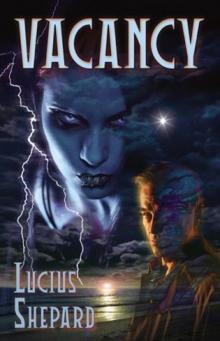 Vacancy & Ariel
Vacancy & Ariel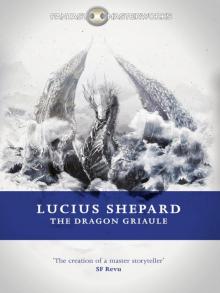 The Dragon Griaule
The Dragon Griaule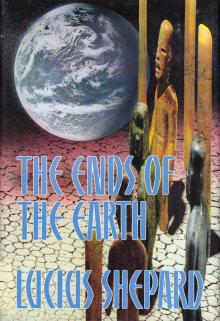 The Ends of the Earth
The Ends of the Earth Two Trains Running
Two Trains Running Life of Buddha
Life of Buddha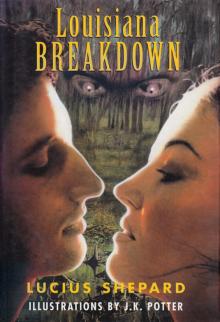 Louisiana Breakdown
Louisiana Breakdown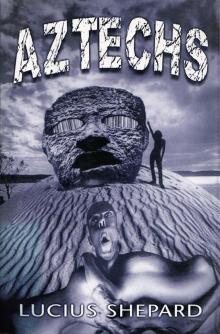 AZTECHS
AZTECHS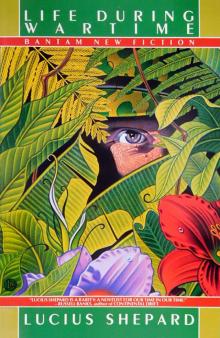 Life During Wartime
Life During Wartime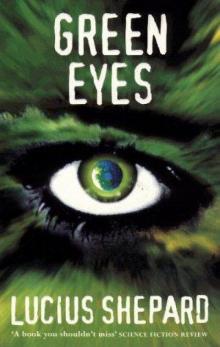 Green Eyes
Green Eyes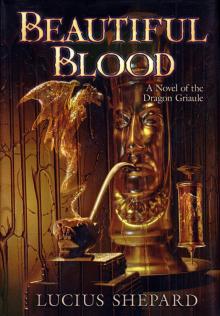 Beautiful Blood
Beautiful Blood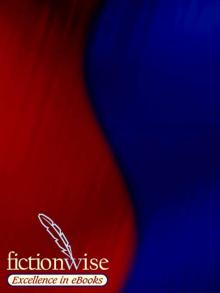 Stars Seen Through Stone
Stars Seen Through Stone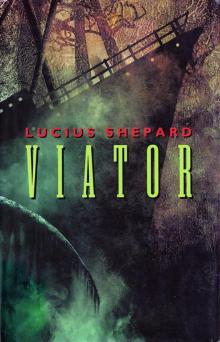 Viator
Viator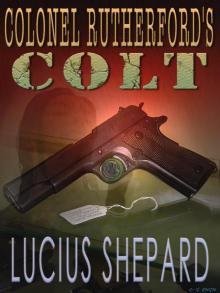 Colonel Rutherford's Colt
Colonel Rutherford's Colt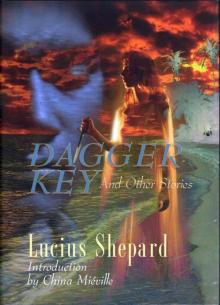 Dagger Key and Other Stories
Dagger Key and Other Stories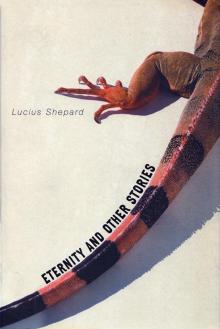 Eternity and Other Stories
Eternity and Other Stories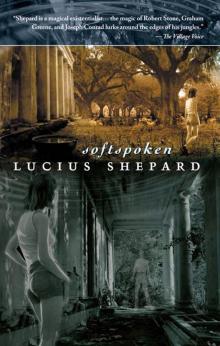 Softspoken
Softspoken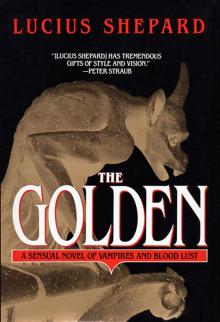 The Golden
The Golden